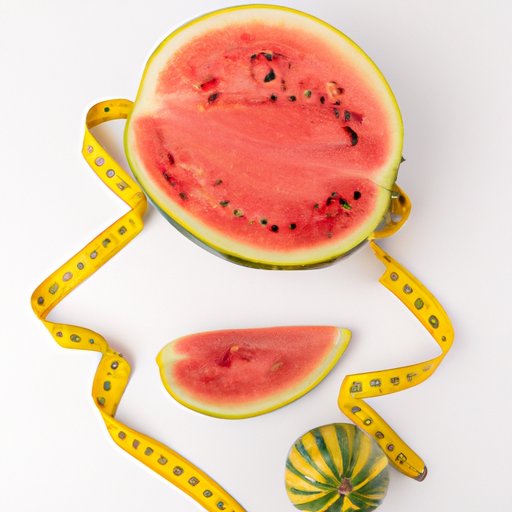
Introduction
When it comes to weight loss, people often think of restrictive eating patterns and bland, unsatisfying food. But what if we told you there’s a fruit that can help you shed off those extra pounds while indulging in a sweet, juicy snack? Yes, you read that right – we’re talking about watermelon! In this article, we’ll explore the nutritional components of watermelon that make it an excellent addition to a weight loss plan, the research behind its benefits, tips on how to incorporate it into meals and snacks, and potential downsides to bear in mind.
Nutritional Components of Watermelon for Weight Loss
Watermelon is a low-calorie, high-water content fruit that contains various essential nutrients that are beneficial for weight loss. For instance, a cup of diced watermelon contains only 46 calories and 92% water, which makes it a filling snack without any significant calorie intake. Moreover, it’s packed with vitamins A, C, and B6, as well as potassium and antioxidants.
The high-water content of watermelon can help you stay hydrated, which is crucial for healthy digestion and metabolism. Moreover, watermelon is low in sodium, which means it won’t contribute to bloating or water retention in your body. Instead, it can help flush out excess water and toxins, leading to a healthier, slimmer body.
Research on the Weight Loss Benefits of Watermelon
Several studies have explored the link between watermelon consumption and weight loss, and the results are promising. For instance, a 2013 study published in the Journal of Nutrition found that obese adults who consumed watermelon as part of a low-calorie diet experienced significant weight loss, reduced body mass index (BMI), and improved lipid profiles after six weeks. The researchers attributed these benefits to the diuretic and satiety-inducing properties of watermelon.
Watermelon contains a compound called citrulline, which can convert into arginine, an amino acid that helps dilate blood vessels and lower blood pressure. This effect can reduce inflammation and improve insulin sensitivity, which is beneficial for weight loss. Moreover, the high-water content and low energy density of watermelon can help you feel fuller for longer, reducing your calorie intake without feeling hungry or deprived.
Creative Ways to Incorporate Watermelon into a Weight Loss Diet
One of the best things about watermelon is its versatility – you can enjoy it in various forms, from salads to smoothies to sorbets. Here are some creative ways to incorporate watermelon into your weight loss plan:
- Watermelon salad: Toss cubed watermelon with feta cheese, arugula, and a drizzle of balsamic vinaigrette for a sweet and savory salad that’s both refreshing and filling.
- Watermelon smoothie: Blend frozen watermelon chunks with Greek yogurt, honey, and a splash of lime juice for a protein-rich drink that can serve as a meal replacement or snack.
- Watermelon sorbet: Freeze watermelon cubes and blend them until smooth to make a refreshing, low-calorie dessert that’s perfect for hot summer days.
- Watermelon salsa: Mix diced watermelon with chopped cilantro, red onion, and jalapeno pepper for a tangy salsa that you can serve with whole-grain tortilla chips or grilled chicken.
Remember that moderation is key when it comes to weight loss, so while watermelon is a healthy and delicious fruit, it’s still important to keep an eye on your overall calorie intake and make sure you’re consuming a balanced diet that meets your nutritional needs.
Tips for Selecting and Storing Watermelons
To get the most out of your watermelon, it’s essential to pick a ripe and fresh one and store it correctly. Here’s what you need to know:
- Look for a symmetrical watermelon that’s free of bruises, cracks, or soft spots.
- Tap the watermelon with your fingers and listen for a hollow sound, which indicates that it’s ripe and juicy.
- Check the weight of the watermelon – a ripe one should feel heavy for its size.
- Store the watermelon in a cool, dry place away from direct sunlight until you’re ready to eat it.
- Cut the watermelon into slices or cubes and store them in an airtight container in the fridge for up to five days.
Potential Downsides of Consuming Too Much Watermelon
Although watermelon is a healthy and low-calorie fruit, it’s still important to be mindful of any potential downsides, especially if you have certain medical conditions. For instance, watermelon has a high natural sugar content, and consuming too much of it can lead to blood glucose level fluctuations for people with diabetes. Moreover, it’s possible to overdose on vitamin A and potassium if you consume excessive amounts of watermelon, leading to toxicity and other health problems.
If you have any concerns about incorporating watermelon into your diet, consult a healthcare professional to make sure it’s suitable for your needs and preferences.
Conclusion
Watermelon is a delicious and nutritious fruit that can be a valuable addition to a weight loss diet. Its low calorie count, high water content, and rich nutritional profile make it an excellent tool for satisfying hunger without sabotaging your weight loss goals. However, it’s important to consume watermelon in moderation and be aware of any potential downsides, particularly if you have specific health conditions. By following the tips and strategies outlined in this article, you can enjoy the benefits of watermelon while staying on track with your weight loss journey.





